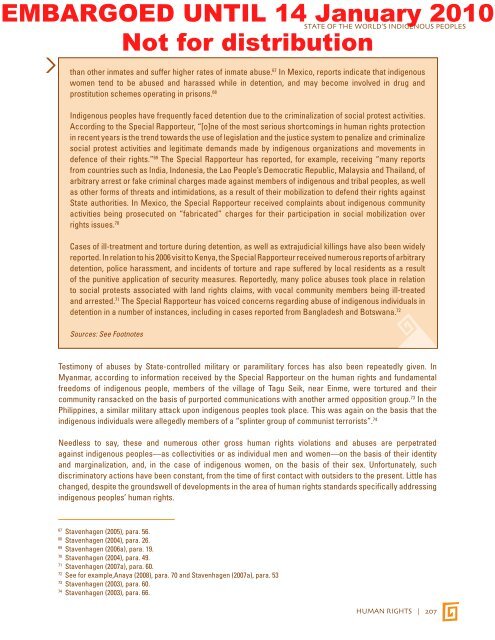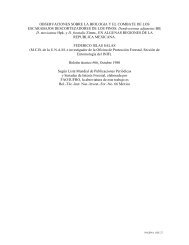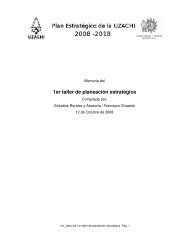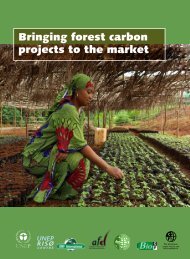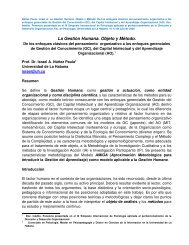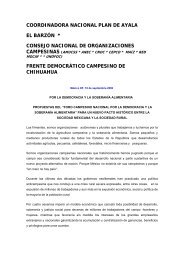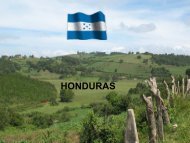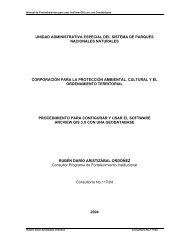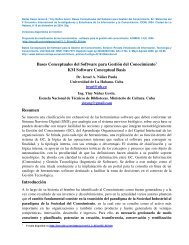STATE OF THE WORLD's INDIGENOUs PEOpLEs - CINU
STATE OF THE WORLD's INDIGENOUs PEOpLEs - CINU
STATE OF THE WORLD's INDIGENOUs PEOpLEs - CINU
- No tags were found...
Create successful ePaper yourself
Turn your PDF publications into a flip-book with our unique Google optimized e-Paper software.
EMBARGOED UNTIL 14 January 2010<strong>STATE</strong> <strong>OF</strong> <strong>THE</strong> WORLD’S INDIGENOUS PEOPLESNot for distributionthan other inmates and suffer higher rates of inmate abuse. 67 In Mexico, reports indicate that indigenouswomen tend to be abused and harassed while in detention, and may become involved in drug andprostitution schemes operating in prisons. 68Indigenous peoples have frequently faced detention due to the criminalization of social protest activities.According to the Special Rapporteur, “[o]ne of the most serious shortcomings in human rights protectionin recent years is the trend towards the use of legislation and the justice system to penalize and criminalizesocial protest activities and legitimate demands made by indigenous organizations and movements indefence of their rights.” 69 The Special Rapporteur has reported, for example, receiving “many reportsfrom countries such as India, Indonesia, the Lao People’s Democratic Republic, Malaysia and Thailand, ofarbitrary arrest or fake criminal charges made against members of indigenous and tribal peoples, as wellas other forms of threats and intimidations, as a result of their mobilization to defend their rights againstState authorities. In Mexico, the Special Rapporteur received complaints about indigenous communityactivities being prosecuted on “fabricated” charges for their participation in social mobilization overrights issues. 70Cases of ill-treatment and torture during detention, as well as extrajudicial killings have also been widelyreported. In relation to his 2006 visit to Kenya, the Special Rapporteur received numerous reports of arbitrarydetention, police harassment, and incidents of torture and rape suffered by local residents as a resultof the punitive application of security measures. Reportedly, many police abuses took place in relationto social protests associated with land rights claims, with vocal community members being ill-treatedand arrested. 71 The Special Rapporteur has voiced concerns regarding abuse of indigenous individuals indetention in a number of instances, including in cases reported from Bangladesh and Botswana. 72Sources: See FootnotesTestimony of abuses by State-controlled military or paramilitary forces has also been repeatedly given. InMyanmar, according to information received by the Special Rapporteur on the human rights and fundamentalfreedoms of indigenous people, members of the village of Tagu Seik, near Einme, were tortured and theircommunity ransacked on the basis of purported communications with another armed opposition group. 73 In thePhilippines, a similar military attack upon indigenous peoples took place. This was again on the basis that theindigenous individuals were allegedly members of a “splinter group of communist terrorists”. 74Needless to say, these and numerous other gross human rights violations and abuses are perpetratedagainst indigenous peoples—as collectivities or as individual men and women—on the basis of their identityand marginalization, and, in the case of indigenous women, on the basis of their sex. Unfortunately, suchdiscriminatory actions have been constant, from the time of first contact with outsiders to the present. Little haschanged, despite the groundswell of developments in the area of human rights standards specifically addressingindigenous peoples’ human rights.67Stavenhagen (2005), para. 56.68Stavenhagen (2004), para. 26.69Stavenhagen (2006a), para. 19.70Stavenhagen (2004), para. 49.71Stavenhagen (2007a), para. 60.72See for example,Anaya (2008), para. 70 and Stavenhagen (2007a), para. 5373Stavenhagen (2003), para. 60.74Stavenhagen (2003), para. 66.HUMAN RIGHTS | 207


